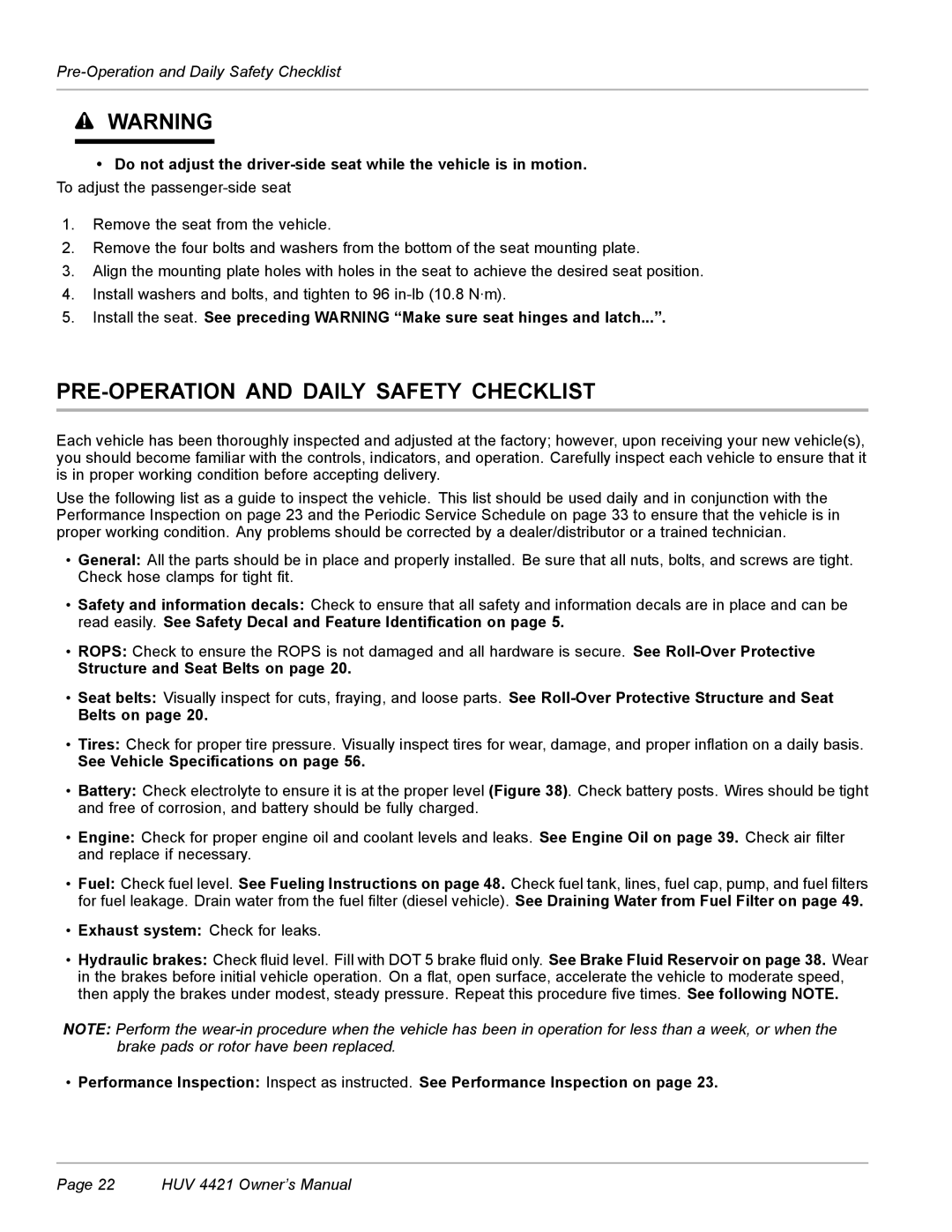
![]() WARNING
WARNING
• Do not adjust the
To adjust the
1.Remove the seat from the vehicle.
2.Remove the four bolts and washers from the bottom of the seat mounting plate.
3.Align the mounting plate holes with holes in the seat to achieve the desired seat position.
4.Install washers and bolts, and tighten to 96
5.Install the seat. See preceding WARNING “Make sure seat hinges and latch...”.
PRE-OPERATION AND DAILY SAFETY CHECKLIST
Each vehicle has been thoroughly inspected and adjusted at the factory; however, upon receiving your new vehicle(s), you should become familiar with the controls, indicators, and operation. Carefully inspect each vehicle to ensure that it is in proper working condition before accepting delivery.
Use the following list as a guide to inspect the vehicle. This list should be used daily and in conjunction with the Performance Inspection on page 23 and the Periodic Service Schedule on page 33 to ensure that the vehicle is in proper working condition. Any problems should be corrected by a dealer/distributor or a trained technician.
•General: All the parts should be in place and properly installed. Be sure that all nuts, bolts, and screws are tight. Check hose clamps for tight fit.
•Safety and information decals: Check to ensure that all safety and information decals are in place and can be read easily. See Safety Decal and Feature Identification on page 5.
•ROPS: Check to ensure the ROPS is not damaged and all hardware is secure. See
Structure and Seat Belts on page 20.
•Seat belts: Visually inspect for cuts, fraying, and loose parts. See
Belts on page 20.
•Tires: Check for proper tire pressure. Visually inspect tires for wear, damage, and proper inflation on a daily basis.
See Vehicle Specifications on page 56.
•Battery: Check electrolyte to ensure it is at the proper level (Figure 38). Check battery posts. Wires should be tight and free of corrosion, and battery should be fully charged.
•Engine: Check for proper engine oil and coolant levels and leaks. See Engine Oil on page 39. Check air filter and replace if necessary.
•Fuel: Check fuel level. See Fueling Instructions on page 48. Check fuel tank, lines, fuel cap, pump, and fuel filters for fuel leakage. Drain water from the fuel filter (diesel vehicle). See Draining Water from Fuel Filter on page 49.
•Exhaust system: Check for leaks.
•Hydraulic brakes: Check fluid level. Fill with DOT 5 brake fluid only. See Brake Fluid Reservoir on page 38. Wear in the brakes before initial vehicle operation. On a flat, open surface, accelerate the vehicle to moderate speed, then apply the brakes under modest, steady pressure. Repeat this procedure five times. See following NOTE.
NOTE: Perform the
•Performance Inspection: Inspect as instructed. See Performance Inspection on page 23.
Page 22 HUV 4421 Owner’s Manual
